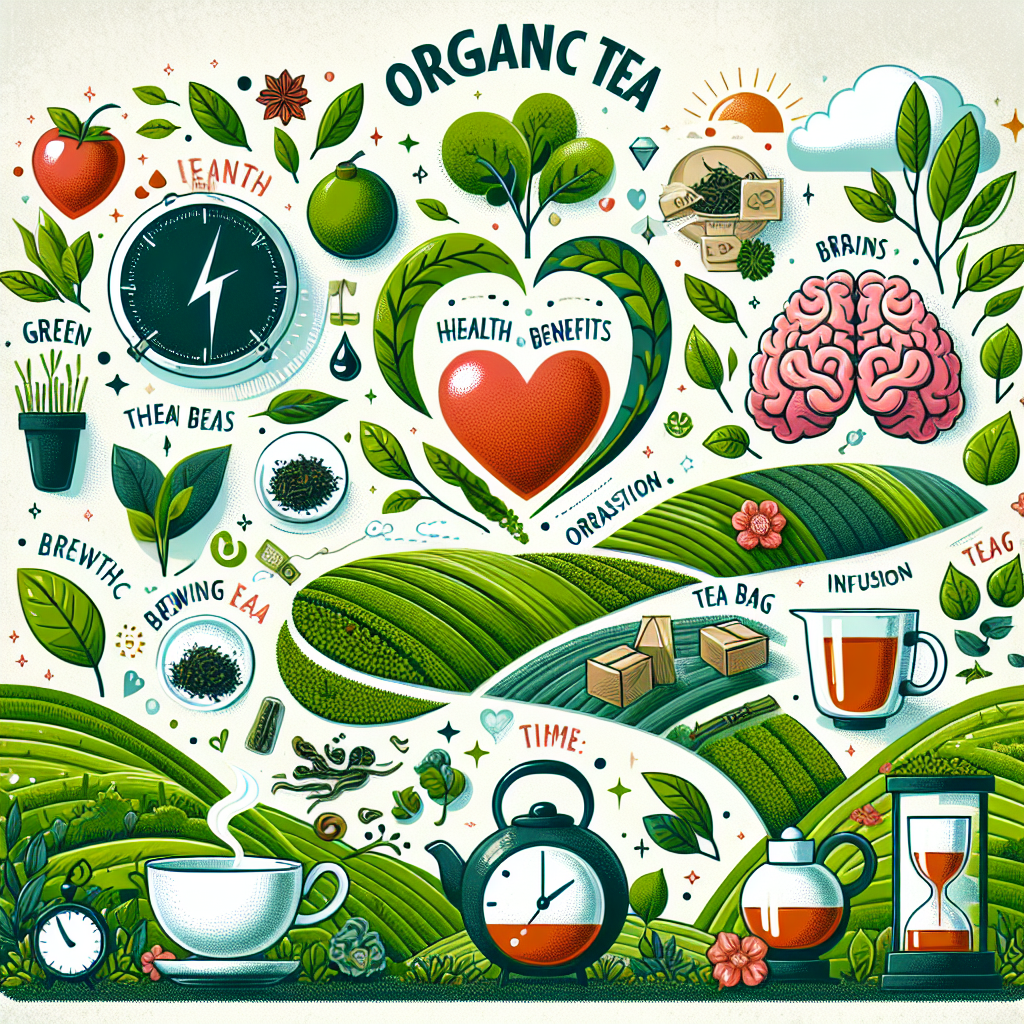Introduction to Organic Tea

Organic tea has been gaining popularity as more people become aware of the health benefits and environmental advantages associated with organic farming practices. Unlike conventional tea, which may be grown with synthetic fertilizers, pesticides, and herbicides, organic tea is cultivated using natural methods that promote ecological balance and biodiversity. This makes organic tea not only a healthier choice for consumers but also a more sustainable one for the planet.
Varieties of Organic Tea
There are numerous varieties of organic tea, each with its unique flavor profile and health benefits. The most common types include organic green tea, black tea, white tea, oolong tea, and herbal infusions. Let us delve deeper into these varieties.
Organic Green Tea
Organic green tea is made from unfermented leaves and is one of the least processed types of tea. This results in a high concentration of antioxidants called polyphenols, which are known for their health benefits. Organic green tea has a light, refreshing flavor and a slightly astringent taste. It is often associated with a wide range of health benefits, including improved brain function, fat loss, and a lower risk of cancer.
Organic Black Tea
Organic black tea is made from fully fermented tea leaves, which gives it a robust flavor and a dark color. It contains a higher caffeine content compared to green tea and offers a rich, full-bodied taste. Black tea is known for its potential benefits on heart health, such as reducing bad cholesterol levels and improving gut health.
Organic White Tea
Organic white tea is made from the youngest leaves and buds of the tea plant. It is the least processed of all teas, which helps to preserve its delicate flavor and high antioxidant content. White tea has a lighter, more subtle taste compared to green or black tea. It is often praised for its anti-aging properties and its ability to help protect against certain types of cancer.
Organic Oolong Tea
Organic oolong tea is a partially fermented tea, which places it somewhere between green and black tea in terms of oxidation. It has a complex flavor that can vary from sweet and fruity to woody and roasted. Oolong tea is known for its weight loss benefits, as it can help boost metabolism and promote fat burning.
Herbal Infusions
Herbal infusions, often called herbal teas, are not made from the Camellia sinensis plant like the other types of tea mentioned. Instead, they are made from a blend of herbs, flowers, and spices. Popular herbal infusions include chamomile, peppermint, and rooibos. These infusions are typically caffeine-free and offer a variety of health benefits, such as aiding digestion, promoting relaxation, and boosting the immune system.
Health Benefits of Organic Tea
Organic tea offers a plethora of health benefits due to its high concentration of antioxidants, vitamins, and minerals. Here are some of the most significant health benefits associated with drinking organic tea.
Rich in Antioxidants
Organic tea is rich in antioxidants such as polyphenols, which help to combat free radicals in the body. Free radicals are unstable molecules that can cause oxidative stress, leading to chronic diseases such as cancer and heart disease. The antioxidants in organic tea help to neutralize these free radicals, thereby reducing the risk of these diseases.
Boosts Heart Health
Several studies have shown that regular consumption of organic tea can help improve heart health. For instance, green tea has been shown to lower bad cholesterol (LDL) levels and increase good cholesterol (HDL) levels. Black tea has been linked to a reduced risk of stroke and heart attack due to its ability to improve blood vessel function.
Aids in Weight Loss
Organic tea, particularly green tea and oolong tea, has been found to aid in weight loss by boosting metabolism and increasing fat oxidation. The catechins in green tea are particularly effective in promoting fat loss, especially in the abdominal area.
Improves Brain Function
The caffeine content in organic tea can help improve brain function by enhancing alertness, mood, and cognitive performance. Additionally, the amino acid L-theanine found in tea works synergistically with caffeine to provide a more sustained and stable energy boost without the jitteriness often associated with coffee.
Promotes Digestive Health
Herbal infusions such as peppermint and ginger tea are well known for their digestive benefits. They can help soothe the digestive tract, reduce bloating, and alleviate symptoms of irritable bowel syndrome (IBS). Additionally, the polyphenols in green and black tea can help promote the growth of beneficial gut bacteria.
Enhances Immune Function
Organic tea contains various compounds that can help strengthen the immune system. For example, green tea is rich in epigallocatechin gallate (EGCG), which has been shown to enhance immune function. Herbal teas like echinacea and elderberry are also well known for their immune-boosting properties.
Brewing the Perfect Cup of Organic Tea
Brewing the perfect cup of organic tea requires a bit of knowledge and attention to detail. Here are some expert tips to help you make the most out of your organic tea experience.
Choosing the Right Water
Water quality can significantly affect the taste of your tea. Always use fresh, filtered water if possible. Avoid using tap water with a high mineral content or any off-flavors, as this can make your tea taste unpleasant.
Water Temperature
The ideal water temperature varies depending on the type of tea you are brewing. For green tea and white tea, which are more delicate, use water that is heated to around 160-180°F (70-80°C). For black tea and oolong tea, use water that is just below boiling, around 200-212°F (93-100°C). Herbal infusions typically require boiling water (212°F or 100°C).
Steeping Time
Steeping time is another critical factor that affects the flavor and strength of your tea. Over-steeping can make your tea bitter, while under-steeping can make it weak. Here are some general guidelines:
- Green tea: Steep for 2-3 minutes.
- White tea: Steep for 4-5 minutes.
- Black tea: Steep for 3-5 minutes.
- Oolong tea: Steep for 4-7 minutes.
- Herbal infusions: Steep for 5-7 minutes.
Tea-to-Water Ratio
The amount of tea leaves you use will depend on personal preference and the type of tea. A general rule of thumb is to use one teaspoon of loose leaf tea per cup of water. However, some teas, such as oolong, may require a bit more due to their larger leaf size.
Preheating Your Teapot or Cup
Preheating your teapot or cup can help maintain the temperature of your tea while it steeps. Simply pour some hot water into the teapot or cup, let it sit for a minute, and then discard the water before adding the tea leaves and fresh hot water.
Experiment and Enjoy
Brewing the perfect cup of tea is a personal journey. Don’t be afraid to experiment with different water temperatures, steeping times, and tea-to-water ratios until you find what works best for your taste.
Conclusion
Organic tea offers a rich and diverse world of flavors and health benefits. By choosing organic tea, you are not only making a healthier choice for yourself but also supporting sustainable farming practices that benefit the environment. Whether you prefer the robust flavor of black tea, the delicate taste of white tea, or the refreshing notes of green tea, there is an organic tea out there for everyone. By following the expert brewing tips provided, you can ensure that you make the most out of your organic tea experience. So, go ahead and explore the wonderful world of organic tea – your body and mind will thank you.
